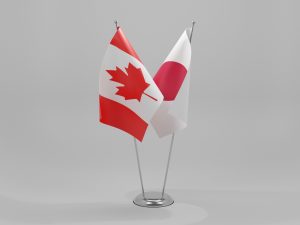On July 8, Japanese Foreign Minister Takeshi Iwaya and Canadian Foreign Minister Anita Anand signed the Security of Information Agreement (SIA) to enable exchanges of national security-related data and facilitate two-way defense procurements. Japan already has similar agreements with the U.S., the U.K., and Australia. Negotiations for the SIA began over two years ago – before the start of the current Trump administration – and signing such an agreement was the first bullet point under the Japan-Canada “Action Plan for contributing to a free and open Indo-Pacific region” inked in October 2022.
During her two-day trip to Japan, when the agreement was signed, Anand penned an op-ed for The Japan News. In it she stated, “Canada is determined to use its G7 presidency this year to show the world there is a viable alternative to the global disorder we are seeing. Japan, a longtime friend of Canada, is central to this vision of upholding the rules-based international order and the rule of law, respecting territorial integrity, and protecting human rights and democratic values.”
General Jennie Carignan, Canada’s chief of the defense staff, similarly highlighted Japan’s importance to Canada in an interview with The Japan Times on the sidelines of the Shangri-La Dialogue last month. Japan is a “priority partner” for Canada. Furthermore, “We oppose unilateral positioning in the region because it is destabilizing and affects our capacity to freely access our various trade partners. Hence, our commitment to be present in the area, to allow for the international rules to be followed and ensure that freedom of navigation is exercised.”
The SIA would be legally binding and must still be ratified by parliament. The deal does not authorize or specify what information will be exchanged, but it does regulate how sensitive data will be shared, handled, stored, and disposed of by Japan and Canada.
Iwaya noted, “With this agreement… the sharing of confidential security information between Canada and Japan will become markedly smoother.” Anand described the SIA as giving Canada and Japan the “tools we need to strengthen our security partnership.”
While the SIA allows for greater security cooperation, the Japanese and Canadian governments and private sector actors must take advantage of the streamlined framework to truly get the benefits of security cooperation. Information security deals normally allow vetted firms to access classified information and bid on sensitive procurements in foreign markets. To truly collaborate, the Japanese government must be willing to let Canadian firms participate in opportunities in their defense, security, aerospace, marine, nuclear, and space industries – and vice versa. Just as importantly, the Japanese and Canadian firms must have an interest in pursuing such collaboration.
The next steps in Japan-Canada security cooperation would be the signing of a bilateral defense equipment and technology transfer deal. Canada may also become the fifth country since 2022 to sign a visiting forces pact with Japan. Australia, the U.K., and the Philippines already have such agreements with Japan, and France is likely to complete one soon. A visiting forces agreement could open the door to larger and more complex joint military training on each other’s territory and rotational troop deployments. Japan and Canada – in addition to greater collaboration through the Five Eyes arrangement – may also find themselves collaborating as partners in the U.S.-U.S.-Australia AUKUS Pillar II arrangement. The Royal Canadian Navy frigate HMCS Ville de Quebec will dock in Japan and participate in drills with the Maritime Self-Defense Force (MSDF) this summer, and Japan is interested in participating in Canada’s Arctic defense exercise, Operation Nanook.
Japan-Canada cooperation is also growing in importance in non-security domains. On the sidelines of the NATO Summit in The Hague last month, Iwaya and Anand agreed on the importance of realizing the free and open Indo-Pacific, lauded Canada’s initiatives to monitor illegal fishing activities and illicit maritime activities in the region, and discussed economic issues, including energy cooperation, LNG Canada, and small modular reactors. At the most recent meeting between Iwaya and Anand, they also welcomed the start of imports of Canadian LNG by the Japanese private sector.
During Prime Minister Ishiba and Canadian Prime Minister Mark Carney’s meeting on the sidelines of the G7 Summit in Kananaskis, also last month, Ishiba and Carney touched on the SIA – which has been signed now – the agreement concerning transfer of defense equipment and technology, as well as economic issues including energy cooperation, critical minerals cooperation, and the uncertainty of the global economy. Canadian Space Agency (CSA) President Lisa Campbell recently traveled to Japan and met with Japanese Aerospace Exploration Agency (JAXA) President Hiroshi Yamakawa. Japan and Canada are committed to common space goals, such as advancing peaceful exploration of space, strengthening industry ties, and supporting innovation.
Japan is also pursuing an SIA with New Zealand. New Zealand is the only Five Eyes country with which Japan does not have such an agreement yet. Last November, Japan became the first non-Five Eyes country to host a gathering of senior enlisted service members from this intelligence partnership.

































